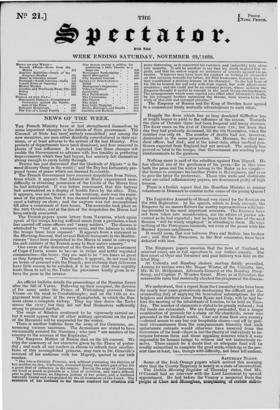NEWS OF THE WEEK.
THE French Ministry have at last strengthened themselves by some important changes in the details of their government. The Council of State has been; entirely remodelled ; and among the new members, are men either decidedly constitutional in their opi- nions, or at least adverse to the system of the last Ministry. Five prefects of departments have been dismissed, and four removed to places of less influence. It is expected that these changes will enable the Government to advance with less timidity in perfecting improvements which they had begun, but scarcely, felt themselves strong enough to carry boldly through. France has just discovered that the blockade of Algiers " is the most illusory thing in the world ;" and the Dey has fortunately pro- posed terms of peace which are deemed favourable. The French Government have received despatches from Patras, from which it appears that Admiral de Rigny experienced more difficulty in obtaining possession of the Castle of the Morea than he had anticipated. It was before announced, that this fortress had surrendered on a display of hostile force by the allies. This, it appears, was not the case : on the contrary, such was the resist- ance of the garrison, that it was deemed necessary for each ship to erect a battery on shore ; and the capture was not accomplished till after a cannonade of four hours. The surrender took place on the 30th October, and at the date of the despatches the Morea had been entirely evacuated. The French papers quote letters from Navarino, which again speak of the troops having suffered much from a pestilence, which has carried off some officers and "many soldiers." The disease is attributed to "bad air, excessive rains, and the labours to which the troops have been exposed." It appears from a statement in the Morning Journal, that several British transports in the Mediter- ranean "have been despatched to the Morea to assist in conveying the sick soldiers of the French army to their native country." One cause of the discontent of the Greeks with the government of Capo d'Istria seems to be—as in richer and better regulated communities—the taxes : they are said to be "ten times as great as they formerly were." The Greeks, it appears, do not even live on terms of concord with the French ; and certainly their deliverers have little reason to be satisfied, if it be true that their cupidity leads them to sell to the Turks the provisions kindly given to re- lieve the poor in the interior.


















